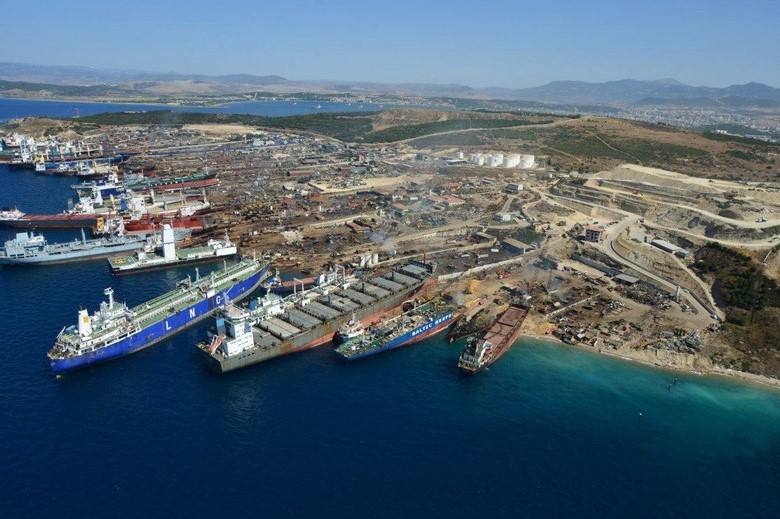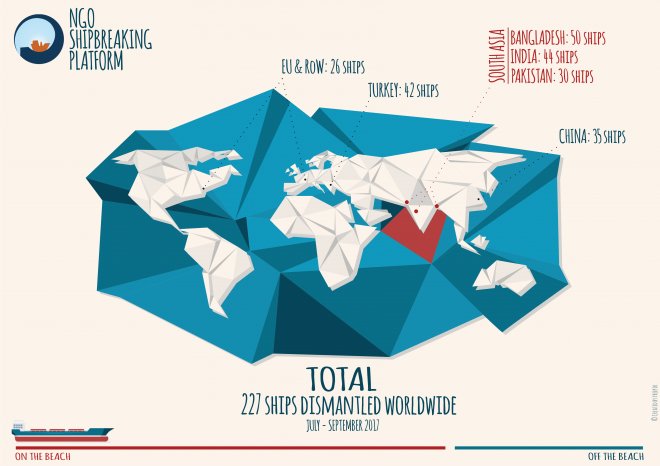The ship recycling industry finds its place in a natural technological process in reducing the maritime risks to a minimum when withdrawal of ships completed their economic life cycle are being replaced by ships in new tonnage and environmentally friendly technology with more operating efficiency. Ship recycling is undoubtedly the most “environmentally friendly” way of disposal of the ships reached at the end of their business life. In world trade 45,000 ships over 300 Grt are still around at sea (about 1.7 billion DWT). The average age of these vessels are over 20 years old. Statistically ships over 15 years of age are in the high risk group causing accidents resulting in environmental disasters.
From 2010 on, staring with the gradual withdrawal of single-hull tankers and the age of the merchant fleet taken into consideration the emergence of a great steel waste caused by dismantling is becoming inevitable. Currently, 15 million tons of ships should be recycled worldwide per year.
The main reasons for starting in 2009 with the effects of the global crisis the capacity increase in the Turkish ship recycling industry declined by 30% in 2014 could be explained as follows; China’s intervention in the market with ingot, instability caused by the fluctuations in the Turkish purchase price up to $ 150 in ship scrap in 2014 and cannot be able to compete with the purchase prices with these countries particularly led by India and China.
TURKEY’S SCRAP CAPACITY – CONTRIBUTION TO THE ECONOMY
While the ship recycling industry was generally the unheeded and back staged sector more for underdeveloped countries earlier, global warming and the increase in unemployment, decrease in natural resources have made the field of activity carefully monitored byall countries. Currently in the world, five of them being European Union countries in 16 countries ship recycling activities are fully in effect. In our country,Aliaga being the only ship-scrap Region,22 ship recycling companies exist with their ship dismantling permission from Environment and Urban Planning Ministry and the ship-scrap eligibility permit from the General Directorate of Shipyards and Coastal Structures.
Ship recycling data by years
Benefits of the ship recyclingindustry to theeconomy could possibly be categorizedunder 3 main headings as raw material, value added and employment.
The contribution oftheship dismantlingindustryto the country’s economy could be summarized as the employment of the personnel and the workers who works in the ship-scrapindustry, the savings from paidforeign currency and the ship is meantto remain within the borders of the country save 60 USD dismantlingcostsroughlyper tonstoscrap.In addition,the contractorthatbuiltthecompany engaged indismantlingourwork, subcontractors, when thecourierand other servicesthatare alsotaken into account, it appears that at leastfor 10,000peoplean employment opportunity is indirectlybeing created.
Added Value Contribution
Ship-scraping will provide a significant advantage for iron-steel factories in terms of competition; even though it seemslike an importbased sector at a first glance, the iron and steel mills that are in production in the country can purchase the raw material they need from ship recycling sector, instead of importing directly, and reflecting the gain in their production cost.
Employment Contribution
When operating at full capacity the ship-scraping industry (900,000 LDT) employees about
1800 employee sin26 parcels. With the subsector contractors, subcontractors, transporters and other ancillary services and staff working in related industries employment reachesabout10,000 people.
The ship-scraping industry, along with these benefits also contributes to the development of transportation sector in Aliaga and its surroundings. The yellowandredaluminumextracted fromscrapedships are being used infoundriesproducingvariousmaterialswhich untilrecently wereimported from abroadused by theTurkish automotive industryprovidingthe manufacturedomestically.
TurkishShip RecyclingIndustryprospectshas takenits place among thepromisingsectorsin terms of environmentaland occupational healthamongEuropean and Asian countries. It is expected tocontinue to increase theship recycling capacity with the implementation of the EU directive in 2015.
Turkeyis strivingto be a leaderamong the countries involved in recycling industry with the
attention toits proximity toEurope and moving astepfurther bybeingan important party ininternational conventionsandtaking the necessary stepstowardshelping as well as leading with the preparation ofthese agreements. Being involved as a sidepractitioner sofar, Turkey has now becomea rule maker. Around the objectives of 2015, less man power with more automation facilities ford is mantling possibilities are being researched. As of May 2015,43 vessels have arrived at our ship-scraping plants. The totalweight of steel for these in coming ships is 250,000 tons. The average tonnage of the vessels in 2015 compared to the previous year differs from previous year sin 2015 arrival of larger tonnage ships to the plants has been observed. This situation is expected to continue until the end of the year.


